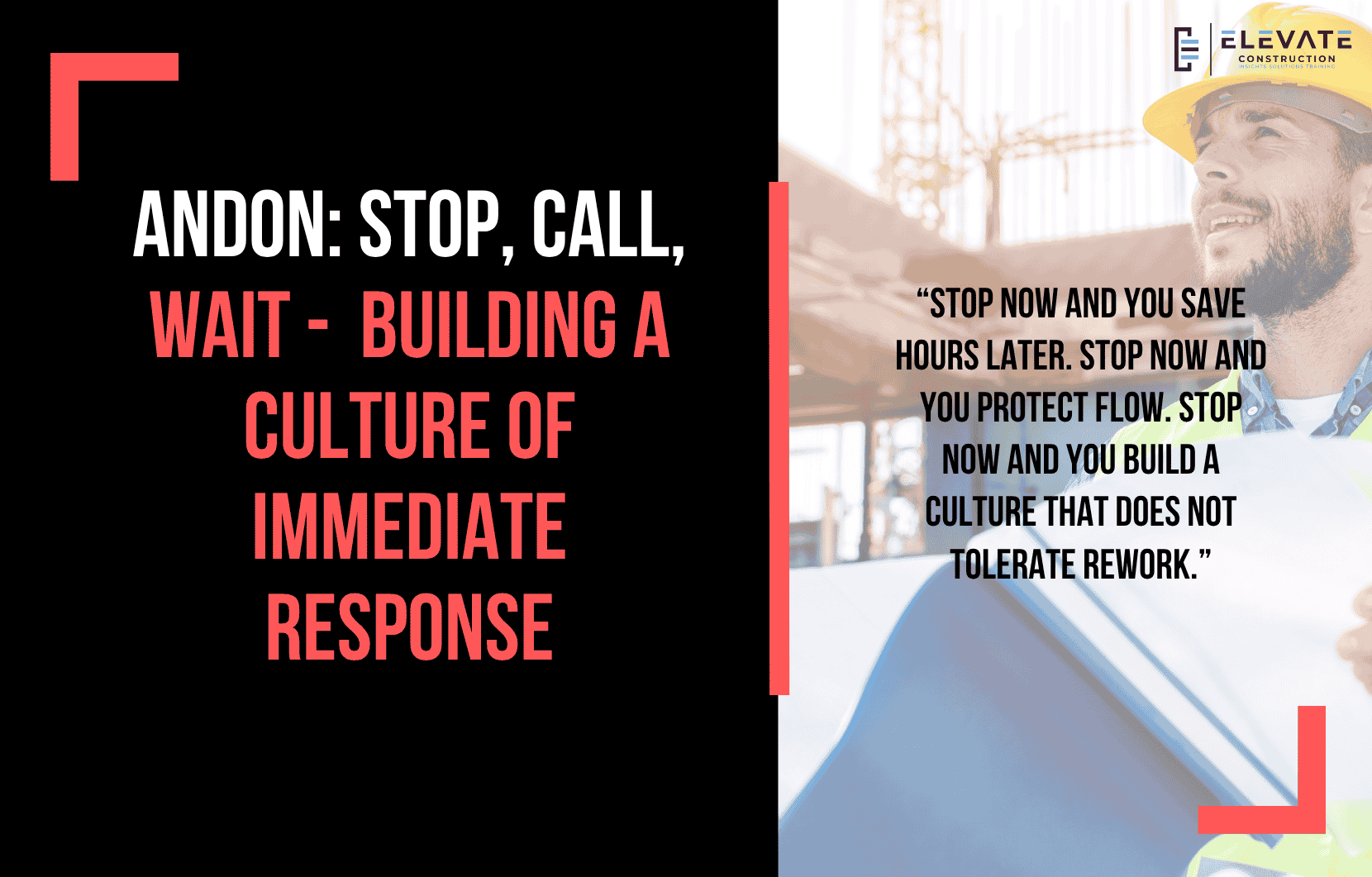Andon: Stop, Call, Wait – Building a Culture of Immediate Response
One of the most powerful concepts I brought home from learning with Paul Akers in Japan is the Andon mindset. Stop if there is any kind of variation or problem. Call your team. Wait to restart the line until you have full kit and the problem is fully resolved.
This simple sequence changes everything.
Toyota does it over two thousand times a day across the globe. FastCap does it. Countless lean companies in Japan do it. And once you see it in action, you realize how much time and quality western culture loses by pushing through instead of stopping to fix.
In this blog, I want to walk you through why stop, call, wait is so transformative and how it applies directly to construction and organizational life.
The Principle: Stop the Moment You See Variation
In Japan, I watched line workers respond to the smallest variation. A screw felt slightly different. A latch had a touch more resistance. Anything that was even a bit off was enough for the worker to pull the Andon cord, pause the line, call the team leader, and reset the system.
This attention to micro variation shocked me. Not big problems. Not major failures. Slight variation.
I saw this in everyday life too. Paul once hosted Japanese guests at his home. One guest tried to open a door that was a little stiff. Instead of pushing through, she stopped, called Paul, and asked for help. To her, variation signals a possible defect. That level of respect for quality is remarkable.
What Happens When the Andon Cord is Pulled
When a worker detects variation and pulls the cord, everything stops. The entire line. Every workstation. Every person. All operations pause until the issue is corrected.
A team leader arrives, evaluates the part, changes it, confirms the fix, and restarts the line only after a point and call check.
And they do this with no blame. No frustration. No “just push through.” They protect flow by protecting quality.
Western culture often sees this level of stopping as overkill. In reality, it is the only way to eliminate rework and maintain predictable flow.
Why We Struggle With This in the West
Western manufacturing and construction inherited a push mindset from Frederick Taylor and decades of busy culture:
- Just start.
- We will sort it out later.
- We do not have full kit but go anyway.
- Push that trade ahead even if another is not ready.
- There is a defect but keep going.
- We will rework it downstream.
- Rush. Hustle.
There is one word for this way of thinking: it is wasteful.
Rework costs at least eight times the original effort and often closer to one hundred times. Every push past variation damages quality, trust, flow, and the brand.
Stop, call, wait prevents that.
But applying it in western companies is uncomfortable because it goes against decades of muscle memory. When leaders stop the line, people sometimes feel scolded even though the intent is kindness, respect, and process improvement.
Full Kit: Do Not Start Unless You Can Finish
Another key element comes from Dr. Efrat Ashlag Goldratt and Rami Goldratt.
Do not start unless you have full kit to finish.
Most teams start with partial kit, missing information, missing materials, missing clarity, and then scramble through chaos. Full kit eliminates chaos before it starts.
- Stop, call, wait is how you enforce full kit.
- If you cannot finish as planned, you do not start.
- If you hit variation mid-stream, you stop and correct.
Applying Andon to Your Own Company
When I came back to LeanTakt, I immediately saw breakdowns in our own internal processes. One example was our meeting scheduling system. A time zone mismatch caused dozens of people to wait for me in a free two hour Takt Production System course. That is disrespectful to their time.
- So we stopped the line.
- We paused work.
- We fixed the process.
And even that small operational pause felt shocking because western culture is conditioned to push through.
But stop, call, wait is not punishment. It is the highest form of respect for people. It shifts our mindset from blaming individuals to improving processes.
Rework Is the Silent Destroyer
Every time you push a defect down the line, you multiply the cost. Every time you skip a variation, you hurt your brand. Every time you push without full kit, you lose time, trust, and predictability.
Stop now and you save hours later. Stop now and you protect flow. Stop now and you build a culture that does not tolerate rework.
The Challenge for All of Us
Here is the question I want you to take back to your team:
How can you teach your organization to stop, call, and wait not only for big problems but for small variations and never start a process unless you have full kit to finish?
That single shift will change your quality, your predictability, your team culture, and your flow.
If you want to learn more we have:
-Takt Virtual Training: (Click here)
-Check out our Youtube channel for more info: (Click here)
-Listen to the Elevate Construction podcast: (Click here)
-Check out our training programs and certifications: (Click here)
-The Takt Book: (Click here)
Discover Jason’s Expertise:
Meet Jason Schroeder, the driving force behind Elevate Construction IST. As the company’s owner and principal consultant, he’s dedicated to taking construction to new heights. With a wealth of industry experience, he’s crafted the Field Engineer Boot Camp and Superintendent Boot Camp – intensive training programs engineered to cultivate top-tier leaders capable of steering their teams towards success. Jason’s vision? To expand his training initiatives across the nation, empowering construction firms to soar to unprecedented levels of excellence.
On we go

